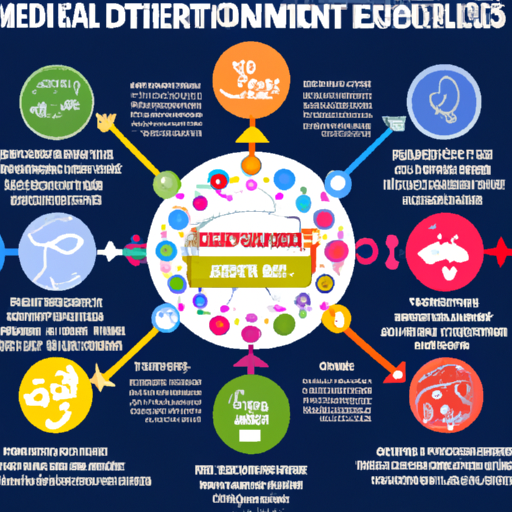Navigating the Maze of Metabolic Disorders and Endocrine Diseases: Diagnosis, Causes, and Treatment Options

In today’s fast-paced world, metabolic disorders and endocrine diseases have become increasingly prevalent. These conditions can have a significant impact on an individual’s overall health and well-being, making it crucial to understand their diagnosis, symptoms, and causes. Furthermore, finding effective treatment approaches is vital to managing these conditions and improving quality of life. This article aims to provide a comprehensive overview of diet for metabolic disorders and endocrine diseases, exploring the diagnosis and symptoms of these conditions, unraveling their causes, and discussing the most effective treatment approaches available. By shedding light on these important aspects, individuals affected by metabolic disorders and endocrine diseases can gain a better understanding of their conditions and take proactive steps towards managing their health.
1. Understanding Metabolic Disorders and Endocrine Diseases: Diagnosis and Symptoms
Metabolic disorders and endocrine diseases are conditions that affect the body’s metabolism and hormone production, respectively. These disorders can have a significant impact on an individual’s overall health and well-being. Understanding the diagnosis and symptoms of these conditions is crucial for effective management and treatment.
Diagnosis of metabolic disorders and endocrine diseases often involves a comprehensive evaluation of a patient’s medical history, physical examination, and laboratory tests. The medical history helps identify any risk factors or genetic predispositions that may contribute to the development of these disorders. The physical examination allows healthcare professionals to assess any visible signs or symptoms related to metabolic or endocrine dysfunction.
Laboratory tests play a critical role in diagnosing these disorders. Blood tests are commonly used to measure hormone levels, blood sugar levels, and other metabolic markers. For example, elevated blood glucose levels may indicate diabetes mellitus, a common metabolic disorder. Hormone tests can help identify abnormalities in the production or function of specific hormones, such as thyroid-stimulating hormone (TSH) for thyroid disorders.
Symptoms of metabolic disorders and endocrine diseases can vary depending on the specific condition. Some common symptoms include weight gain or loss, fatigue, increased thirst or hunger, changes in appetite, frequent urination, and abnormal growth patterns. For instance, individuals with hypothyroidism may experience weight gain, fatigue, and sensitivity to cold due to a decrease in thyroid hormone production.
It is worth noting that symptoms can often be nonspecific or overlap with other medical conditions, making the diagnosis challenging. Therefore, it is essential for individuals experiencing any concerning symptoms to consult a healthcare professional for a thorough evaluation.
These disorders can have various causes, including genetic factors, lifestyle choices, and certain medical conditions. Some metabolic disorders, such as diabetes, can be influenced by both genetic predisposition and environmental factors like diet and exercise habits. Endocrine diseases, on the other hand, can be caused by hormonal imbalances, tumors affecting hormone-producing glands, or autoimmune disorders.
In conclusion, the diagnosis and symptoms of metabolic disorders and endocrine diseases are crucial
2. Unraveling the Causes of Metabolic Disorders and Endocrine Diseases
Metabolic disorders and endocrine diseases are complex conditions that can have a variety of causes. Understanding the underlying factors behind these disorders is crucial for accurate diagnosis and effective treatment.
One major cause of metabolic disorders and endocrine diseases is genetics. Some individuals may have inherited gene mutations that affect the functioning of specific hormones or enzymes involved in metabolism or hormone regulation. For example, genetic mutations can lead to conditions like diabetes mellitus, congenital adrenal hyperplasia, or polycystic ovary syndrome (PCOS). In these cases, the body’s ability to maintain normal metabolism or hormone balance is compromised.
Another cause of metabolic disorders and endocrine diseases is hormonal imbalances. Hormones play a crucial role in regulating various metabolic processes and maintaining overall homeostasis in the body. When there is an overproduction or underproduction of certain hormones, it can disrupt the normal functioning of organs and systems. For instance, an overproduction of thyroid hormones can result in hyperthyroidism, while an underproduction can lead to hypothyroidism.
In addition to genetics and hormonal imbalances, lifestyle factors can also contribute to the development of metabolic disorders and endocrine diseases. Poor diet, sedentary lifestyle, and obesity are known risk factors for conditions like type 2 diabetes, metabolic syndrome, and certain hormonal disorders. These lifestyle choices can lead to insulin resistance, inflammation, and dysregulation of various metabolic pathways.
Certain medications and medical conditions can also be causative factors for metabolic disorders and endocrine diseases. For example, long-term use of corticosteroids can disrupt glucose metabolism and lead to conditions like steroid-induced diabetes. Similarly, certain autoimmune diseases, such as Hashimoto’s thyroiditis or Addison’s disease, can cause dysfunction in the endocrine system.
Environmental factors, such as exposure to toxins or pollutants, may also play a role in the development of metabolic disorders and endocrine diseases. Chemicals found in certain plastics, pesticides, and industrial pollutants have been associated with disruptions in hormone production and metabolism.
In conclusion, the causes of metabolic disorders
3. Effective Treatment Approaches for Metabolic Disorders and Endocrine Diseases
Effective Treatment Approaches for Metabolic Disorders and Endocrine Diseases
When it comes to managing metabolic disorders and endocrine diseases, a multifaceted approach is often necessary. Treatment strategies aim to alleviate symptoms, manage underlying causes, and restore normal hormone levels to improve overall health and quality of life. While specific treatments vary depending on the disorder and individual patient, there are several effective approaches commonly used.
1. Medications: Medications play a crucial role in managing metabolic disorders and endocrine diseases. Depending on the condition, different types of medications may be prescribed. For instance, individuals with diabetes may require insulin therapy or oral medications to regulate blood sugar levels. Thyroid disorders may be treated with synthetic hormones to restore normal thyroid function. Adrenal insufficiency may be managed with corticosteroid replacement therapy. Medications are tailored to the specific needs of each patient and are often combined with lifestyle modifications for optimal results.
2. Lifestyle Modifications: Lifestyle changes are essential in managing metabolic disorders and endocrine diseases. These modifications may include dietary adjustments, regular exercise, weight management, and stress reduction techniques. For instance, individuals with diabetes can benefit from a well-balanced diet that focuses on low glycemic index foods and portion control. Regular physical activity helps improve insulin sensitivity and overall metabolic function. Lifestyle modifications can have a significant impact on disease management and may even help reduce the need for medication in some cases.
3. Hormone Replacement Therapy: For individuals with endocrine diseases that result in hormone deficiencies, hormone replacement therapy (HRT) is often recommended. HRT involves replacing the deficient hormone with synthetic hormones to restore normal hormonal balance. This approach is commonly used for conditions such as hypothyroidism, menopause, and certain pituitary disorders. HRT can alleviate symptoms, improve overall well-being, and prevent complications associated with hormone deficiencies.
4. Surgical Interventions: In some cases, surgical interventions may be necessary to treat metabolic disorders and endocrine diseases. For instance, individuals with certain types of obesity or metabolic disorders resistant to other treatments may




